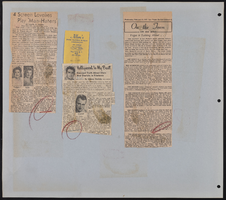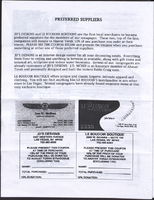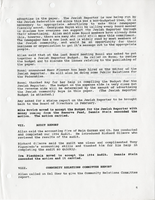Search the Special Collections and Archives Portal
Search Results
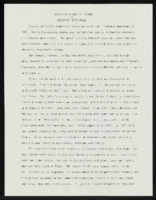
"Apologies Across The Board": article draft by Roosevelt Fitzgerald
Date
Archival Collection
Description
From the Roosevelt Fitzgerald Professional Papers (MS-01082) -- Drafts for the Las Vegas Sentinel Voice file. On Las Vegas fire chief publicizing excellent work ethic of LDS firefighters.
Text

Transcript of interview with Yvonne and Joni Fried by Barbara Tabach, February 17, 2016
Date
Archival Collection
Description
Yvonne Fried, M.D., and Joan “Joni” Fried are the daughters of Milton and Esther Fried, the founders of Freed’s Bakery—the standard to which all other Las Vegas bakeries are held. When the Fried family moved to Las Vegas in 1955, Joni was born here, the fifth child, of the entrepreneurial Milton, a musician by night, and his industrious wife Esther, who guided the family business. As Esther’s 2006 obituary reads: in 1959 the couple opened “a snack bar, selling donuts and Danish, at the Panorama Market on West Charleston, while Milt played in the show band at the Sahara Hotel in the evenings.” For Yvonne and Joni, this made for a rather busy and interesting household to grow up in. Their Jewish upbringing was at Temple Beth Sholom. Photo above honors the multi-generations of the Freed’s Bakery tradition: (L-R) Joni Fried, Anthony & Sarah Fusco (Joni’s daughter) Max Jacobson Fried (Yvonne’s son) holding his son Lucas, and (far right) is his wife Emilia.
Text
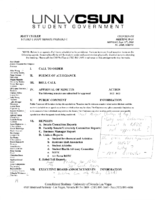
Meeting minutes for Consolidated Student Senate, University of Nevada, Las Vegas, September 15, 2008
Date
Archival Collection
Description
Text
Urban, Ruth Pearson, 1948-
Ruth Pearson Urban was born in 1948 in Los Angeles, California. At the age of ten, she moved to Las Vegas with her mother and older sister. Urban spent most of her childhood in the Huntridge area and was always heavily involved with Temple Beth Sholom. After graduating from Las Vegas High School, Urban attended the University of Nevada, Las Vegas where she received a bachelor’s degree in social work, and later, a master’s degree in counseling.
Person
Alterwitz-Stralser, Deanne
Deanne Alterwitz-Stralser (née Friedman) was born January 1, 1931 in Hammond, Indiana, the daughter of an insurance salesman and a stay-at-home mom. Alterwitz-Stralser spent her childhood in Calumet City, just across the state line in Illinois, and was raised with a strong Jewish identity. At the age of sixteen, she met her husband, Oscar Alterwitz, at an Alpha Zadik Alpha (AZA) dance in Gary, Indiana, and the two were married in 1950.
Person
Fisher, Bob (1947 April 29-)
Robert D. "Bob" Fisher is a Las Vegas, Nevada broadcast personality and lobbyist. He was born in Minneapolis, Minnesota and moved to Las Vegas to around 1992 when he was hired as the founding president and CEO of the Nevada Broadcasters Association (NVBA). During his 22 years as head of the NVBA, he produced and hosted Observations, a public affairs program broadcasted on radio and television throughout the state of Nevada.
Person

